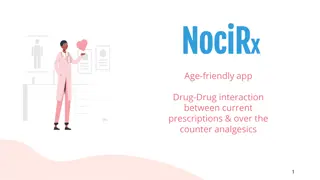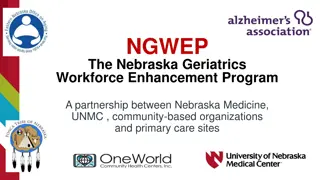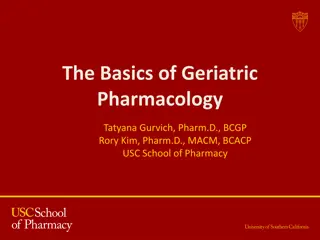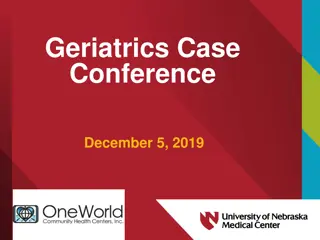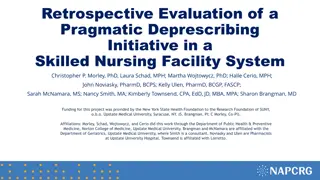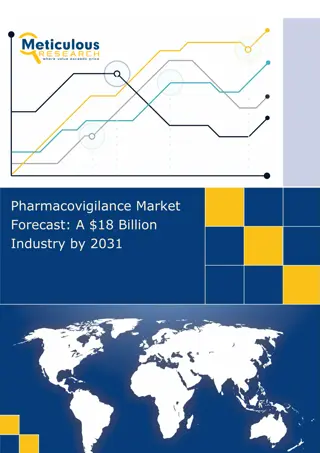Spider Feasibility: A Structured Approach to Quality Improvement
Polypharmacy among seniors is a prevalent issue with potentially harmful consequences. The SPIDER approach, focusing on medication appropriateness through evidence-based quality improvement initiatives, aims to address this challenge. Utilizing a structured process informed by data, evidence, and re
1 views • 15 slides
Age-Friendly App: Managing Drug-Drug Interactions Between Prescriptions and OTC Analgesics
The Age-Friendly app addresses the crucial issue of drug-drug interactions between current prescriptions and over-the-counter analgesics in the geriatric population. With a significant percentage of OTC sales attributed to older adults, there is an increased risk of adverse drug events due to polyph
1 views • 25 slides
Optimizing Geriatric Pharmacotherapy: Challenges and Considerations
This content elaborates on the Nebraska Geriatrics Workforce Enhancement Program, supported by HRSA, focusing on age-friendly primary care and the 4Ms approach to medication management in older adults. It addresses the objectives of understanding factors affecting drug use in the elderly, recognizin
1 views • 42 slides
Comprehensive Guide to Geriatric Medication Management
Explore the essentials of geriatric pharmacology, including the impact of polypharmacy, medication-related problems in the elderly, and practical factors affecting medication management. Learn about medication reconciliation, Beers criteria, and common medications affecting seniors' health and well-
0 views • 25 slides
Understanding Polypharmacy in Older Adults
Polypharmacy is a common concern among older adults, with approximately 40% taking 5-9 medications and 18% taking 10 or more. This module discusses the factors contributing to polypharmacy, consequences of problematic polypharmacy, strategies for detection and intervention, and the difference betwee
1 views • 36 slides
Deprescribing in Older Adults: Strategies and Benefits
Deprescribing is a critical aspect of geriatric care to reduce polypharmacy-related issues in older adults. This program, supported by HRSA, emphasizes defining deprescribing, identifying triggers, overcoming barriers, and implementing tools for optimal patient outcomes. Benefits include fewer falls
2 views • 33 slides
Retrospective Evaluation of Pragmatic Deprescribing in Skilled Nursing Facilities
This study evaluated the effectiveness of a pragmatic deprescribing protocol in reducing medication classes in two skilled nursing facilities. Findings showed significant reductions in diuretics, opioids, antipsychotics, and antibiotics, with slight overall medication changes. Increases in anticoagu
0 views • 6 slides
Pharmacovigilance Market to be Worth $18.05 Billion by 2031
The incidence of ADRs varies and depends on factors such as age, sex, ethnicity, existing disorders, genetic and environmental factors, administration route, treatment duration, dosage, and drug type. Moreover, increased age and polypharmacy also lea
0 views • 4 slides

